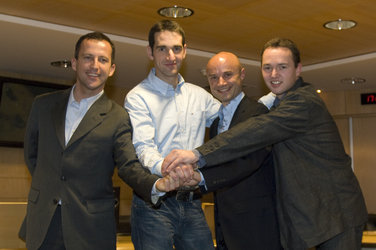European Mars500 participants announced
The final four Europeans who are set to take part in a 105-day simulated Mars mission were presented to the media in Paris today. From March next year, two of the group will join four Russian participants inside an isolation facility in Moscow.
A selection process which started with 5600 applicants has now been finalised with the presentation today of the final four participants at ESA’s Headquarters in Paris, France.
“These four men are highly motivated individuals,” says Jennifer Ngo-Anh, ESA's Mars500 Programme Manager. “Of course they are adventurous and also very ambitious, but not overly competitive. They have shown themselves to be good team players, which also makes them ideal participants for the study.”
Prime and backup crew

After completing a two-month period of training for their mission, two of the group will be chosen as prime crew to join four Russian-selected crewmembers inside the specially designed isolation facility in Moscow. The other two will act as backup crew, stepping in to replace a prime crewmember right up until the last moment if necessary.
For 105 days, as part of a cooperative project between ESA's Directorate of Human Spaceflight and the Russian Institute for Biomedical Problems (IBMP), the six-strong crew will live, eat, sleep and work in the recently refurbished facility.

During this time they will experience elements of a simulated Mars mission. Their stay is in preparation for the full Mars500 study due to start later in 2009, which will see another six-member crew sealed in the chamber to experience a complete 520-day Mars mission.
The purpose of the Mars500 study is to gather data, knowledge and experience to help prepare one day for a real mission to Mars. The participants will act as subjects in scientific investigations to assess the effect that isolation has on various psychological and physiological aspects, such as stress, hormone regulation and immunity, sleep quality, mood and the effectiveness of dietary supplements.
A unique experience

It is no surprise to hear that all four men are very proud to have reached the final selection. “I am honoured and curious to continue with the project,” says Frenchman Cedric Mabilotte (34) from Paris. "It is a unique experience at the heart of current human spaceflight activities. These will be stories to tell to our grandchildren!"
"It is also a lot of responsibility of course," adds airline pilot Cyrille Fournier (40) from France. "I know the Mars500 programme is important for ESA and, I hope, for space exploration. So it is quite a responsibility to make sure that all the experiments go correctly and that we can collect some interesting results."

Most of us would not relish the prospect of spending 15 weeks confined in a small space with five other people, but Arc'hanmael Gaillard (32), an electrical engineer from Rennes, France, is confident he will cope. "I have spent several years working in a clean room, so I am accustomed to confined environments," says Gaillard. "I am looking forward to proposing solutions that can ultimately improve conditions on a real mission to Mars."
The participants have already started to think about personal items they will take with them into the facility. Because of limited storage space, each crewmember will be allowed to take in just one average sized suitcase of items. Like the other three participants, Oliver Knickel (28), a mechanical engineer in the German army, doesn't plan to take anything big: "Probably some family pictures, possibly some music and some books so I will have something to read and pass some time."
Challenges

All four are in agreement; it will be difficult to be away from friends and family for so long. Although, Knickel believes successfully completing the study will be the biggest personal challenge. "To go into it and to successfully take part," explains Knickel. "The whole time not giving up and completing the whole mission."
"The hardest part will probably be the little details in everyday life – something we didn’t expect," adds Fournier. "It is easier to prepare and train for things that you can expect and plan to happen, but if something comes up that you hadn’t expected in advance you won’t be prepared to deal with it."
"The human factor is to me the most interesting and complex, it will be a deep micro-social experience," says Mabilotte. "It will be a challenge not in the sense of 'difficulty', but in the sense of a 'meaningful experience'."
The four participants will start their training in Moscow in January. The crew of six is set to enter the isolation facility at the start of the 105-day study on 24 March 2009.
More information:
Jennifer Ngo-Anh
ESA Mars500 Programme Manager
Tel. +31 71 565 8609
Mars500 @ esa.int
Markus Bauer
ESA Communication Officer for the Directorate of Human Spaceflight
Tel: + 31 71 565 6799
Markus.Bauer @ esa.int















 Germany
Germany
 Austria
Austria
 Belgium
Belgium
 Denmark
Denmark
 Spain
Spain
 Estonia
Estonia
 Finland
Finland
 France
France
 Greece
Greece
 Hungary
Hungary
 Ireland
Ireland
 Italy
Italy
 Luxembourg
Luxembourg
 Norway
Norway
 The Netherlands
The Netherlands
 Poland
Poland
 Portugal
Portugal
 Czechia
Czechia
 Romania
Romania
 United Kingdom
United Kingdom
 Slovenia
Slovenia
 Sweden
Sweden
 Switzerland
Switzerland































